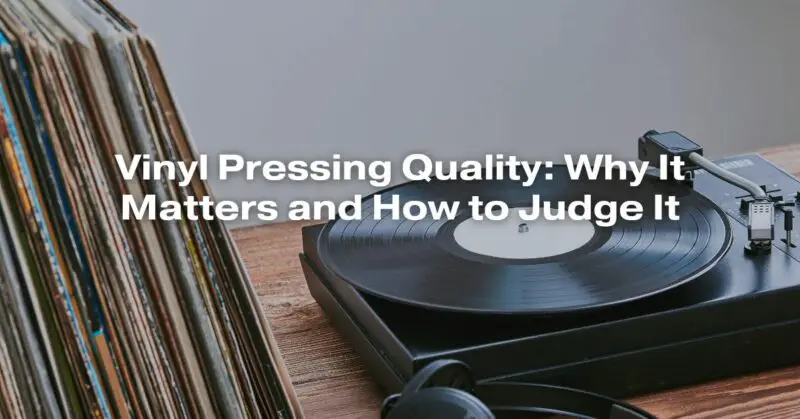In a world dominated by digital streaming and downloads, vinyl records have experienced a remarkable resurgence. Audiophiles and music enthusiasts are rediscovering the warm, analog sound of vinyl, as well as the tactile experience of handling and playing records. However, not all vinyl records are created equal. Vinyl pressing quality plays a pivotal role in the overall enjoyment of your music. In this article, we will delve into why vinyl pressing quality matters and provide you with the knowledge to judge it effectively.
Why Vinyl Pressing Quality Matters
- Sound Quality:
One of the most compelling reasons why vinyl pressing quality matters is its direct impact on sound quality. Vinyl records reproduce music through analog grooves, and the quality of these grooves is paramount. Poorly pressed vinyl can result in surface noise, pops, crackles, and a diminished dynamic range. In contrast, a well-pressed vinyl record can deliver a warm, detailed, and rich sound that digital formats often struggle to replicate.
- Durability:
Vinyl records are an investment in music that can last a lifetime if cared for properly. High-quality vinyl pressing ensures durability. A well-pressed record is less prone to warping, scratches, and other forms of damage. This longevity ensures that your favorite albums can be enjoyed for years to come without significant degradation in sound quality.
- Artwork and Packaging:
Vinyl records are celebrated not only for their sonic qualities but also for their tangible appeal. Quality vinyl pressing extends to the artwork and packaging. A well-designed album cover and inserts can enhance the overall experience of owning a vinyl record. Cheap or poorly printed artwork can detract from the overall value and enjoyment.
- Collectibility:
For collectors, the condition and quality of a vinyl record are of utmost importance. Collectible records often fetch higher prices when they are in excellent condition. Quality pressing can significantly enhance the value of a vinyl record over time, making it a valuable addition to any collection.
How to Judge Vinyl Pressing Quality
Now that we’ve established why vinyl pressing quality matters, let’s explore how to evaluate it effectively:
- Visual Inspection:
- Examine the vinyl surface under good lighting conditions. Look for visible defects such as scratches, scuffs, or manufacturing imperfections.
- Check the vinyl for warping, which can affect playback quality. Place the record on a flat surface and observe if it spins evenly without wobbling.
- Surface Noise:
- Play the vinyl and listen for surface noise, pops, or crackles. Some surface noise is normal, especially in older records, but excessive noise can indicate pressing issues.
- Clean the record and stylus regularly to minimize surface noise caused by dust and debris.
- Dynamic Range:
- Pay attention to the dynamic range of the music. A well-pressed vinyl should reproduce the full spectrum of sound, from quiet to loud passages, without distortion or compression.
- Compare the vinyl to a digital version of the same recording to assess the vinyl’s ability to capture subtle details.
- Runout Groove:
- Examine the runout groove area at the end of the vinyl. A well-pressed record will have clean, well-defined etchings that include relevant information.
- Poorly executed runout grooves can affect the tracking and playback of the record.
- Weight and Thickness:
- Quality vinyl records are often heavier and thicker than their lower-quality counterparts. Heavier vinyl can help reduce surface noise and improve tracking.
- Be cautious of records that feel flimsy or overly lightweight, as they may not offer the best sound quality or durability.
- Brand Reputation:
- Research the reputation of the record label or pressing plant responsible for the vinyl. Some labels and plants have a track record of producing high-quality pressings.
- Online forums, reviews, and collector communities can be valuable sources of information regarding vinyl quality.
Conclusion
Vinyl pressing quality is a crucial factor in determining the enjoyment and longevity of your record collection. A well-pressed vinyl record can deliver exceptional sound quality, durability, and collectible value. By visually inspecting records, listening for surface noise, and considering factors such as weight and thickness, you can effectively judge the quality of vinyl pressings. Investing in high-quality vinyl records ensures that you can savor the timeless charm of analog music for years to come.


